八年级英语资料
八年级津津有味的英语必读
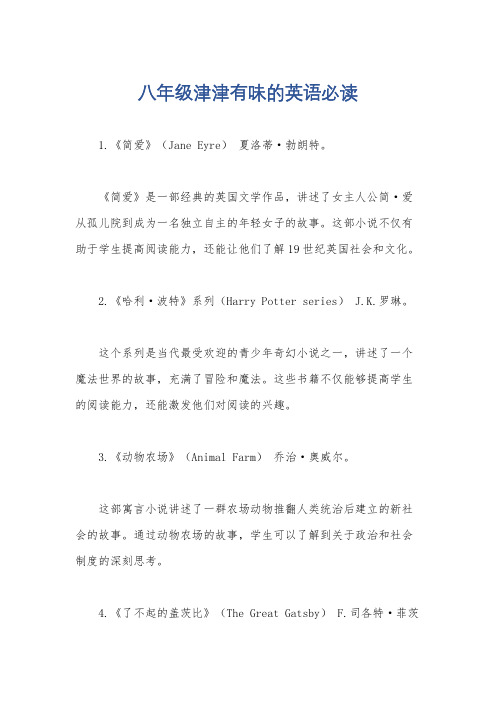
八年级津津有味的英语必读1.《简爱》(Jane Eyre)夏洛蒂·勃朗特。
《简爱》是一部经典的英国文学作品,讲述了女主人公简·爱从孤儿院到成为一名独立自主的年轻女子的故事。
这部小说不仅有助于学生提高阅读能力,还能让他们了解19世纪英国社会和文化。
2.《哈利·波特》系列(Harry Potter series) J.K.罗琳。
这个系列是当代最受欢迎的青少年奇幻小说之一,讲述了一个魔法世界的故事,充满了冒险和魔法。
这些书籍不仅能够提高学生的阅读能力,还能激发他们对阅读的兴趣。
3.《动物农场》(Animal Farm)乔治·奥威尔。
这部寓言小说讲述了一群农场动物推翻人类统治后建立的新社会的故事。
通过动物农场的故事,学生可以了解到关于政治和社会制度的深刻思考。
4.《了不起的盖茨比》(The Great Gatsby) F.司各特·菲茨杰拉德。
这部小说发生在20世纪二十年代的美国,描写了一个关于爱、财富和欺骗的故事。
通过阅读这本书,学生可以了解到美国文化的变迁和社会问题。
5.《福尔摩斯探案全集》(The Complete Sherlock Holmes)阿瑟·柯南·道尔。
这部侦探小说集包含了福尔摩斯和华生医生一系列惊险刺激的侦探故事。
通过阅读这些故事,学生可以锻炼自己的推理能力和阅读理解能力。
这些书籍都是充满趣味和挑战的,适合八年级学生阅读。
通过阅读这些书籍,学生不仅可以提高自己的英语阅读能力,还可以了解到不同的文化和思想,培养自己的人文素养。
希望这些建议能够帮助你找到合适的英语必读书籍。
八上英语背记知识点

八上英语背记知识点一、名词复数的不规则变化一般情况下,直接在名词词尾加s。
例如:book(书)——books(书)。
以s, x, sh, ch结尾的名词,在词尾加es。
例如:bus(公共汽车)——buses(公共汽车)。
以“辅音字母+y”结尾的名词,变y为i再加es。
例如:city(城市)——cities(城市)。
以f或fe结尾的名词,把f或fe变成v再加es。
例如:knife(刀)——knives(刀)。
以o结尾的名词,有些加es,有些加s。
例如:photo(照片)——photos(照片),zoo(动物园)——zoos(动物园)。
二、动词第三人称单数形式动词第三人称单数形式是在动词后面加“-s”或“-es”。
例如:play(玩)——plays(玩)。
有些动词第三人称单数形式比较特殊,需要单独记忆。
例如:be动词原形是“be”,第三人称单数形式是“is”。
三、情态动词情态动词是表示可能性、必要性、意愿等情感的动词,常用的情态动词有can、may、must 等。
can表示可能性,常用于否定句和疑问句中。
例如:I can’t swim. 我不会游泳。
may表示可能性或请求许可,常用于肯定句和疑问句中。
例如:You may go now. 现在你可以走了。
must表示必要性或必须,常用于肯定句中。
例如:You must finish your homework. 你必须完成作业。
四、现在进行时现在进行时是表示正在进行的动作或存在的状态,其结构是“be+动词-ing”形式。
be动词用现在进行时的形式是“am/is/are”,根据主语人称而定。
例如:I am watching TV. 我在看电视。
动词-ing形式由动词原形+ing构成,其形式与现在分词相同。
例如:swimming(游泳)、playing (玩)、eating(吃)。
五、一般现在时一般现在时是表示经常发生的动作或存在的状态,其结构是“主语+动词原形”或“主语+动词第三人称单数形式”。
8年级上册英语重点
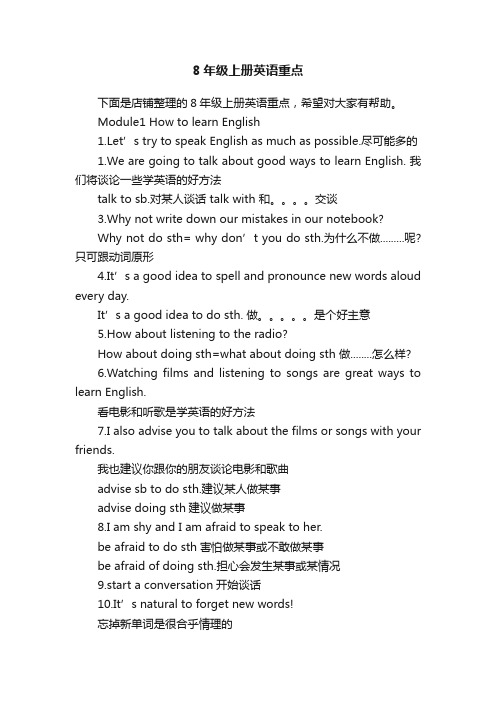
8年级上册英语重点下面是店铺整理的8年级上册英语重点,希望对大家有帮助。
Module1 How to learn English1.Let’s try to speak English as much as possible.尽可能多的1.We are going to talk about good ways to learn English. 我们将谈论一些学英语的好方法talk to sb.对某人谈话 talk with 和。
交谈3.Why not write down our mistakes in our notebook?Why not do sth= why don’t you do sth.为什么不做.........呢?只可跟动词原形4.It’s a good idea to spell and pronounce new words aloud every day.It’s a good idea to do st h. 做。
是个好主意5.How about listening to the radio?How about doing sth=what about doing sth 做........怎么样?6.Watching films and listening to songs are great ways to learn English.看电影和听歌是学英语的好方法7.I also advise you to talk about the films or songs with your friends.我也建议你跟你的朋友谈论电影和歌曲advise sb to do sth.建议某人做某事advise doing sth建议做某事8.I am shy and I am afraid to speak to her.be afraid to do sth害怕做某事或不敢做某事be afraid of doing sth.担心会发生某事或某情况9.start a conversation开始谈话10.It’s natural to forget new words!忘掉新单词是很合乎情理的It’s +adj + for sb. to do sth.对某人来说做某事。
八年级英语复习资料

八年级英语复习资料八年级英语复习资料学好知识就需要平时的积累。
知识积累越多,掌握越熟练,下面店铺为大家搜索整理了八年级复习资料,欢迎参考!一、重点单词1、against可以用来表示跟某人/某个等进行的比赛。
如:WearegoingtohaveabasketballgameagainstClassThreeonSunday.2、winsth.例如:winagame,winarace,winagoldmedal,winfirstplace【注意】win不能用于winsb.,要说打败某人,应该用beat/defeatsb.3、join:①joinsb.表示“加入某人的行列,和某人一起”如Willyoujoinus?你愿意加入我们吗?②join+组织表示“加入某个组织”如Iamgoingtojointheschoolmusicclub.我打算加入学校音乐俱乐部。
③joinin+活动表示“参加某项活动”如Janeisgoingtojoininthevolleyballmatchnextweek.简打算下周参加排球赛。
【联想】takepartin+活动(相当于“joinin+活动”),表示“参加某项活动”。
要注意与join的用法区别,join要加某人或某个组织,joinin才能加“某项活动”(=takepartin+活动)。
4、ski现在分词为skiing[们不要觉得怪怪的,就是这样子]5、row要变成ing形式时,直接加ing,即rowing,因为ow是字母组合。
6、dream(“梦,梦想”之意)是可数名词。
7、job是可数名词,work是不可数名词(work还可以做动词)。
8、exercise①跟体育运动有关的运动、锻炼,是不可数名词。
但要注意如果是做早操或眼保健操exercise要加s②指书本上的练习、作业,是可数名词。
9、①ill不能作定语,一般作表语。
②sick可作定语也可作表语。
Thechildisill.也可说Thechildissick.asickchild(不能说anillchild)10、competition竞赛[可数名词]11、score⑴作为动词是“得分”的意思。
八年级英语人教
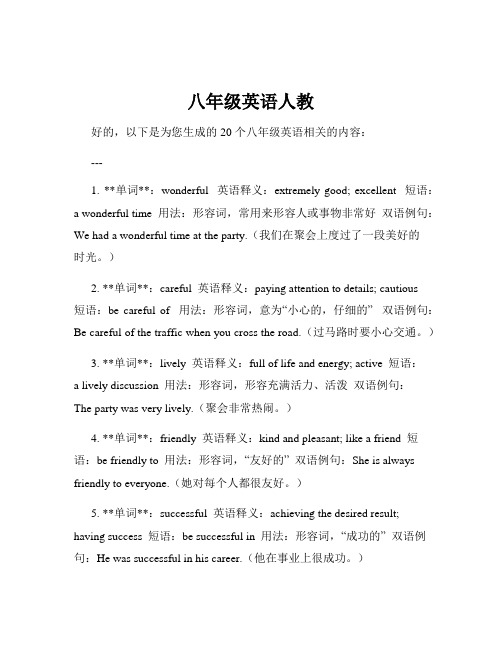
八年级英语人教好的,以下是为您生成的 20 个八年级英语相关的内容:---1. **单词**:wonderful 英语释义:extremely good; excellent 短语:a wonderful time 用法:形容词,常用来形容人或事物非常好双语例句:We had a wonderful time at the party.(我们在聚会上度过了一段美好的时光。
)2. **单词**:careful 英语释义:paying attention to details; cautious短语:be careful of 用法:形容词,意为“小心的,仔细的” 双语例句:Be careful of the traffic when you cross the road.(过马路时要小心交通。
)3. **单词**:lively 英语释义:full of life and energy; active 短语:a lively discussion 用法:形容词,形容充满活力、活泼双语例句:The party was very lively.(聚会非常热闹。
)4. **单词**:friendly 英语释义:kind and pleasant; like a friend 短语:be friendly to 用法:形容词,“友好的” 双语例句:She is always friendly to everyone.(她对每个人都很友好。
)5. **单词**:successful 英语释义:achieving the desired result; having success 短语:be successful in 用法:形容词,“成功的” 双语例句:He was successful in his career.(他在事业上很成功。
)6. **单词**:dangerous 英语释义:likely to cause harm or danger 短语:in dangerous 用法:形容词,“危险的” 双语例句:It's dangerous to play with fire.(玩火是危险的。
人教版八年级初二英语上册高清全版电子教科书

人教版八年级初二英语上册高清全版电子教科书第一单元:人物介绍1.1 课文内容本单元主要介绍了四个人的职业、爱好和外貌特征。
通过阅读,学生可以提高听力、口语和阅读理解能力。
1.2 重点词汇- doctor:医生- engineer:工程师- farmer:农民- teacher:老师- like:喜欢- listen to music:听音乐- play basketball:打篮球- watch movies:看电影- read books:读书- wear glasses:戴眼镜1.3 语法点本单元主要介绍了现在进行时。
现在进行时表示正在进行的动作或存在的状态。
第二单元:家庭成员2.1 课文内容本单元主要介绍了家庭成员的名称和相互关系。
通过阅读,学生可以提高听力、口语和阅读理解能力。
2.2 重点词汇- mother:母亲- father:父亲- sister:姐妹- brother:兄弟- grandmother:祖母- grandfather:祖父- family:家庭2.3 语法点本单元主要介绍了疑问词 who 的用法。
疑问词 who 用于询问人物身份或名称。
第三单元:数字和颜色3.1 课文内容本单元主要介绍了数字和颜色的英文表达。
通过阅读,学生可以提高听力、口语和阅读理解能力。
3.2 重点词汇- one:一- two:二- three:三- four:四- five:五- six:六- seven:七- eight:八- nine:九- ten:十- red:红色- yellow:黄色- blue:蓝色- green:绿色- black:黑色- white:白色3.3 语法点本单元主要介绍了数字和颜色的英文表达。
第四单元:动物和植物4.1 课文内容本单元主要介绍了动物和植物的名称及特点。
通过阅读,学生可以提高听力、口语和阅读理解能力。
4.2 重点词汇- cat:猫- dog:狗- fish:鱼- bird:鸟- elephant:大象- tiger:老虎- lion:狮子- bear:熊- plant:植物- tree:树- flower:花4.3 语法点本单元主要介绍了动物和植物的英文表达。
(完整版)八年级下册Unit8英语知识点
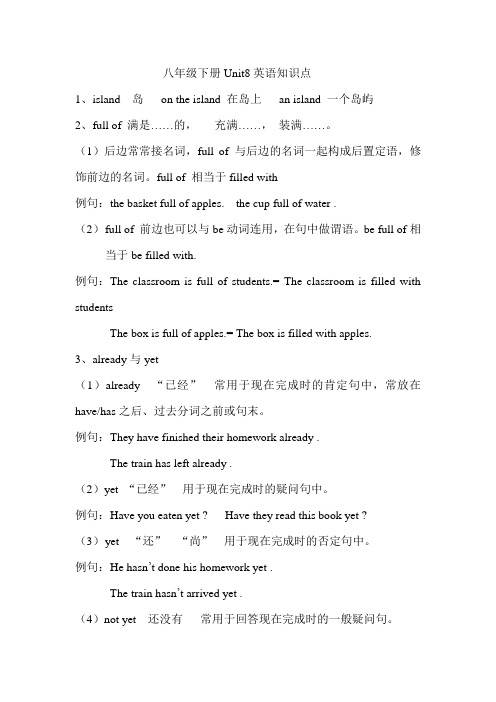
八年级下册Unit8英语知识点1、island 岛on the island 在岛上an island 一个岛屿2、full of 满是……的,充满……,装满……。
(1)后边常常接名词,full of 与后边的名词一起构成后置定语,修饰前边的名词。
full of 相当于filled with例句:the basket full of apples. the cup full of water .(2)f ull of 前边也可以与be动词连用,在句中做谓语。
be full of相当于be filled with.例句:The classroom is full of students.= The classroom is filled with studentsThe box is full of apples.= The box is filled with apples.3、already与yet(1)already “已经”常用于现在完成时的肯定句中,常放在have/has之后、过去分词之前或句末。
例句:They have finished their homework already .The train has left already .(2)yet “已经”用于现在完成时的疑问句中。
例句:Have you eaten yet ? Have they read this book yet ?(3)y et “还”“尚”用于现在完成时的否定句中。
例句:He hasn’t done his homework yet .The train hasn’t arrived yet .(4)not yet 还没有常用于回答现在完成时的一般疑问句。
例句:Have you eaten yet ? Not yet.4、英语中,疑问词what/how/which/where/who/when 后边出现动词时,往往用“疑问词+ to do sth ”结构,此结构在句中可以做主语、宾语和表语.例句:I can’t decide when to start . please tell me what to do next .He doesn’t know where to live . Do you know which to buy ?5、finish doing sth 做完某事例句:Did you finish watching TV ? I have finished cleaning the room .6、put down 放下down是副词,接代词时,代词要放在中间。
人教版八年级英语知识点总结
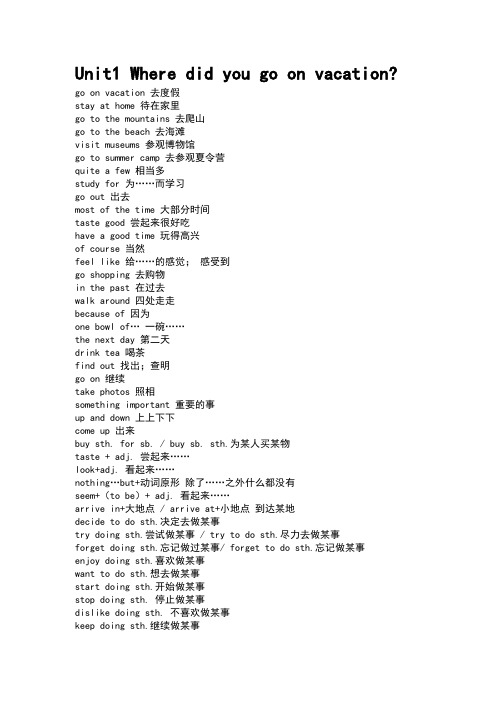
Unit1 Where did you go on vacation? go on vacation 去度假stay at home 待在家里go to the mountains 去爬山go to the beach 去海滩visit museums 参观博物馆go to summer camp 去参观夏令营quite a few 相当多study for 为……而学习go out 出去most of the time 大部分时间taste good 尝起来很好吃have a good time 玩得高兴of course 当然feel like 给……的感觉;感受到go shopping 去购物in the past 在过去walk around 四处走走because of 因为one bowl of…一碗……the next day 第二天drink tea 喝茶find out 找出;查明go on 继续take photos 照相something important 重要的事up and down 上上下下come up 出来buy sth. for sb. / buy sb. sth.为某人买某物taste + adj. 尝起来……look+adj. 看起来……nothing…but+动词原形除了……之外什么都没有seem+(to be)+ adj. 看起来……arrive in+大地点 / arrive at+小地点到达某地decide to do sth.决定去做某事try doing sth.尝试做某事 / try to do sth.尽力去做某事forget doing sth.忘记做过某事/ forget to do sth.忘记做某事enjoy doing sth.喜欢做某事want to do sth.想去做某事start doing sth.开始做某事stop doing sth. 停止做某事dislike doing sth. 不喜欢做某事keep doing sth.继续做某事Why not do. sth.?为什么不做……呢?so+adj.+that+从句如此……以至于……tell sb. (not) to do sth. 告诉某人(不要)做某事Unit2 How often do you exercise?help with housework 帮助做家务 on weekends 在周末how often 多久一次 hardly ever 几乎从不once a week 每周一次 twice a month 每月两次every day 每天 be free 有空go to the movies 去看电影 use the Internet 用互联网swing dance 摇摆舞 play tennis 打网球stay up late 熬夜;睡得很晚 at least 至少have dance and piano lessons 上舞蹈课和钢琴课 the best way to do sth.做某事的最好方式go to bed early 早点睡觉 play sports 进行体育活动be good for 对……有好处 go camping 去野营not…at all 一点儿也不…… in one’s free time 在某人的业余时间the most popular 最受欢迎的 such as 比如;诸如old habits die hard 积习难改 go to the dentist 去看牙医morn than 多于;超过 less than 少于help sb. with sth.帮助某人做某事 . How about…? ...... 怎么样?/ ……好不好?want sb. to do sth.想让某人做某事 How many+可数名词复数+一般疑问句?……有多少……?主语+find+that 从句. ……发现…… spend time with sb.和某人一起度过时光It’s+ adj.+ to do sth. 做某事的……的。
八年级上册英语全部知识点

八年级上册英语全部知识点八年级英语是一个重要的阶段,这个阶段主要通过学习英语语法,掌握基础词汇和语言技能,提高对英语的理解能力和运用能力。
下面是八年级上册英语全部的知识点:语法1. 现在进行时:be+现在分词- 表示现在正在发生的动作- 常用时间状语:now, at the moment等2. 过去时:动词过去式- 表示过去发生的动作- 常用时间状语:yesterday, last week等3. 一般将来时:will+动词原形- 表示将要发生的动作- 常用时间状语:tomorrow, in the future等4. 情态动词- can/could, may/might, will/would, shall/should, must等- 表示能力、推测、意愿、命令、必须等情态5. 被动语态- be+过去分词- 表示动作的承受者是主语,强调动作的结果而非动作的执行者6. 宾语从句- 引导词包括that, if, whether, how等- 在句中作宾语7. 定语从句- 引导词包括that, which, whose, who等- 在句中修饰名词或代词词汇1. 常用动词- be, have, do, go, take, make, come等2. 易混淆词汇- good/well, bad/badly, usually/often等- 意义相近的单词3. 常用名词- person, place, thing, time等4. 常用形容词- big, small, tall, short, interesting, boring等5. 常用副词- slowly, fast, loudly, softly, well等语言技能1. 听力- 听懂基础日常英语对话和简单文章- 通过听写、跟读等训练来提高听力水平2. 口语- 练习日常英语对话,提高口语表达能力- 练习独白和演讲,提高流利度和语感3. 阅读- 阅读简单的英语文章,掌握基础单词和表达方式- 阅读英文小说和资料,提高阅读理解能力4. 写作- 练习书写英文单词和句子,提高写作质量- 练习写作各类文章,如日记、信件、作文等以上就是八年级上册英语全部知识点。
(完整版)仁爱版八年级上册英语知识点汇总(完整版)

八年级上学期英语知识点八年级英语短语总汇Unit1 Topic11.be going to do 打算做某事2.See sb do sth看见某人做某事(全过程)See sb doing sth看见某人正在做某事(正在进行)3.cheer sb on为...加油4.Play against=fight against 与...对抗/大战5.Be against--Be for 反对—赞同6.practice+doing 练习做...7.Prefer+doing 跟喜欢...Prefer doing to doing 或比起做后者,更喜欢做前者Perfer to do, quite a lot/bit/often.Which one do you prefer, which kind of that?10. Join+某人/组织Join in+活动/比赛加入Take part in+活动/比赛Be in+活动/比赛13.Know about... 知道/了解有关于...当时间来临时,我们将采取行动;这是我们的计划。
15. It takes sb+时间/钱 to do sthSpend+时间/钱+(in) doing sth 在某方面花费多少Spend+时间/钱+on+n.物+cost+时间/钱16.There be going to be=there will be 这里将会有...17.Be good at+(doing)sth=Do well in+(doing)sth 擅长做...18.Be sure that+宾语从句确信... 19.Be sure to do 肯定要做...20.Be sure of/about 对...有把握 21.At the weekend 在周末22.Make sb/sth+adj 使...处在什么状态23.Keep+adj 保持...;keep sb/sth+adj 使...保持什么状态24.A way to 一种...的方法 25.Relax oneself 使某人自己放松26.Play for 为...效力27.Arrive in=get to=reach+大地方;Arrive at+小地方28.Excited(人);exciting(物)29.Leave for动身做某地;leave A for B 离开A地去B地Unit1 Topic21.Could you(not)....=cuold/would you please(not)do=would/do youmind(not)doing=Would you mind (not)+if+从句2.fall ill=be ill 生病其中之一是n的复数形式.优化后的文本可以是:Use 'keep doing' for continuous action and 'keep on doing' for repeated action with intervals.5.Help sb.=give sb a hand 帮助某人6.V.+间宾(人)+直宾(物)=V.+直宾+to/for+间宾7.Sure=certainly=of course 当然8.Not at all=certainly not=of course not 不介意9.Never mind=it’s nothing=it’s doesn’t matter 没关系乱扔11.Adj.修饰不定代词放其后12.Be sorry for/about.... 对...感到内疚13.What do you mean by...?=what does...mean?=what’s the meaning of...?意思是什么?14.Shout at sb. 斥责某人15.Do/try one’s best to do sth 尽某人做大的努力做某事16.Be angry with sb. For doing sth 因为某人做某事而生气17.be angry at/about sth 因某事而生气18.be angry with 因...而生气19.With the help of sb.=with one’help 在某人的帮助下20.Say...to sb. 对某人说...e into being=be born 形成/产生22.So...that... 如此...以致...=to...too... 太...而不能...23.A century=one hundred year 一个世纪24.Over=more than 超过25.Through(中间)=aross(表面) 通过阻止他们从做28.It’s + adj +(for sb.)+to do (对某人来说)做...是...29.Another+基数词又一,在一; other +n.复数另外的Around=all_over 处到处31.Just for...只是为了...32.Turn...into... 使...变成...33.Sit around 围坐在34.Get from doing 得到...35.Such as 后不可列出前面所提过的所有东西36.A number of+n.可数复数许多的;the number of+n.单数 ...的数量37.Hero 复数(Pl.) heroesUnit1 Topic31.连字符后不加soman则例外,需用复数。
八年级上册英语笔记

Unit1 How often do you exercise?Section ALange Goal: Talk about how often you do thing .标题释义:知识点 1. how often 的用法:1)how often 是“多久一次”的意思,常用频率副词(always, usually, often, sometimes, hardly ever, never), once a week , two or three times a month ,every day等词来回答。
如果对这些词划线部分提问,则用how often.2)how often 的同义词组是how many times (多少次),所以问句的同义句句是:How many times do you exercise ?3)但是how many times 与how often 的区别是how many times 通常只用once, twice, three times 等来回答。
eg. How often does she go to the movies ?------- Twice a monthHow many times do you watch TV every week ?------- Three times.4)补充:how long 是“多长时间”的意思,回答常用“for…”或”since …”引导的时间状语。
Eg. How long have you been in America ?“他在美国多久了”------- For two years .“两年了”how soon 是“还要多久才…”的意思,一般用将来时态,回答用“in …”引导的时间状语。
eg . How sooon will he be back ? “他多久回来“------- He will be back in an hours . “他一小时后回来”how much 也意为“多少”,但后面跟不可数名词,也对数量提问;同时还可用来询问价格“多少钱”的意思。
八年级全册英语知识点总结

八年级全册英语知识点总结重点句型和短语一、have fun doing sth.【句型介绍】意为\"做某事有乐趣\“,其中have fun相当于enjoy oneself,表示过得愉快。
1.英语中的集体名词,如family, class, team等作主语时,若作为一个整体看,其后的谓语动词用单数;若强调其组成成员,谓语动词用复数。
如:(1)My family is a happy one.我家是个幸福的家庭。
(2)My family are all watching TV.我们全家人都在看电视。
2.在比较级中,要注意than后面人称代词的格。
1)当句子中的谓语动词是不及物动词时,than后面的代词用主格还是宾格,在意思上通常没有区别。
如:(1)He runs faster than I / me.他跑得比我快。
(2)They get to school earlier than we / us every day.他们每天都比我们到校早。
2)当句中的谓语动词是及物动词时,than后面的人称代词用主格还是宾格在意思上就有差别了。
试比较:(1) 1 like you more than he. (=1 like you more than he likes you.) 我比他更喜欢你。
(2)I like you more than him. (=1 like you more than I like him.) 你和他相比,我更喜欢你。
Stop doing/to do/somebody from doing6、Go down7、Have something to do8、Sleeping pills9、Be awake—be asleep10、Light music11、In the band12、Try something/doing something13、Try to do something14、A piece of music15、Again and again16> 系动词:be/sound look seem smell taste feel/get turn become17、Look nice on18> Be/keep quiet19、Instead ofsomething/doing20、Make trouble21、enough+名词/形容词或副词+enough22> Be thin/fat23、Nothing much wrong/nothing serious24N Look over25、At the weekend 26、have been to+地点27、Land on28、Pull something out of/up from29、Keep something cool30、All by oneself=alone31、Perhaps=maybe32、No longer=nomore=not any longer=not any more33、Get back/get something back 34、Sooner or later35、Drop something36、Run after37、Run away 38、Eat up39、On the bank40> A few-few41、A little-little42、A little=a bit43、Pass something to somebody=pass somebody something44Help oneself to45、Hot food46、Seem to do/that47> Fast food 48> Be popular with49、Enjoy/enjoy oneself50、Enjoy something/doing51、Have a taste/taste like52> In the city of53、Both of/both AndB54、Either or/either of55、Neither nor/neither of56、Agree with/to57> With—with out58、Take away—home cooking59> Take a seat60、By the window61、Take one's order62、Go/walk alone/up/down63、Go on64、Cross=go across65、Take the first crossing on theright=turn right at the first crossing66> At/in the corner67、Be sick/ill68、In hospital69> In the hospital70、Arrive at/in / get to / reach71、At the end of72、Feel like doing73、Look over74、Wake somebody up75、It takes somebody + time + to do76、Be wake—be strong77、Quite a long way78、Had better do/not do79、Be happy/sorry/sad to do80、Look around81、情态动词:can/can't/may/must/mustn't/have to82、Be sure about/of/to do/that83、In time/on time84、Make one's way to85、The sign of86、Just then/just now87、Make a noise88、Stand a line89、Wait for one's turn90、Stop doing/to do 91、Jump the queue93、Laugh at94、Make a mistake95、Throw something about96、In fact97、At midnight98、Ring the door bell99、Complain about100Quarrel with somebody 、3.不定式作定语时,应放在被修饰词的后面,一般指一个还没有发生的动作。
英语八年级每课知识点归纳

英语八年级每课知识点归纳第一单元:配套练习1. 词汇:- 单词:student, teacher, classroom, desk, chair, blackboard- 短语:in the classroom, sit down, stand up, look at, listen to, write on - 句式:What's this? It's a book. What's that? It's a pen.2. 语法:- 询问物品的方法:What's this/that?- 回答物品的方法:It's a/an +名词。
- 语序:主语+谓语3. 句型:- I'm a student.- What's this in English? It's an eraser.- What's that in English? It's a ruler.第二单元:book1 module 11. 词汇:- 单词:name, spell, family, sister, brot-her, parent, look, grandpa-rent, friend- 短语:first name, last name, spell it, family name, look at, what about, thank you- 句式:Hello, I'm Helen. Nice to meet you. Nice to meet you, too.2. 语法:- 介绍个人信息:Hello, I'm + 名字。
- 问候:Nice to meet you.3. 句型:- Hi, I'm Tom.- Hello, Tom. I'm Helen. Nice to meet you.- Spell it, please.第三单元:book1 module 21. 词汇:- 单词:country, from, America, China, Australia, Japan, England, French, Canada- 短语:what about, how to say, nice to meet you, have a good trip, welcome to- 句式:Where are you from? I'm from +国家。
英语八年级上册重点知识归纳

英语八年级上册重点知识归纳
摘要:
一、英语八年级上册的重点知识归纳
1.语法:名词、冠词、代词、数词、介词、连词、形容词、副词、动词、句子结构
2.词汇:常用词汇、核心词汇、词汇搭配
3.阅读理解:技巧与实践
4.写作:写作技巧与实践
正文:
英语八年级上册的重点知识归纳主要包括以下几个方面:
一、语法
1.名词:名词的分类、名词的数、名词的所有格
2.冠词:不定冠词、定冠词的用法
3.代词:人称代词、物主代词、指示代词、疑问代词、反身代词、相互代词的用法
4.数词:基数词、序数词的用法
5.介词:介词的分类和常用介词的用法
6.连词:并列连词、从属连词的用法
7.形容词:形容词的分类、形容词的顺序、比较级和最高级的构成和用法
8.副词:副词的分类、副词的位置、比较级和最高级的构成和用法
9.动词:动词的分类、时态、语态、情态动词的用法
10.句子结构:简单句、复合句的构成和用法
二、词汇
1.常用词汇:根据教材内容,整理出常用词汇,方便学生记忆和应用
2.核心词汇:根据课程标准和考试要求,筛选出核心词汇,要求学生熟练掌握
3.词汇搭配:整理出常用的词汇搭配,帮助学生更好地理解和使用英语
三、阅读理解
1.技巧:提供阅读理解的方法和技巧,如快速浏览、寻找关键词等
2.实践:通过阅读理解练习题,让学生在实际操作中掌握阅读理解的技巧
四、写作
1.写作技巧:教授英语写作的基本技巧,如如何开头结尾、如何组织段落、如何使用连接词等
2.实践:通过写作练习,让学生在实际操作中掌握写作技巧,提高写作水平。
英语八年级上册知识点归纳
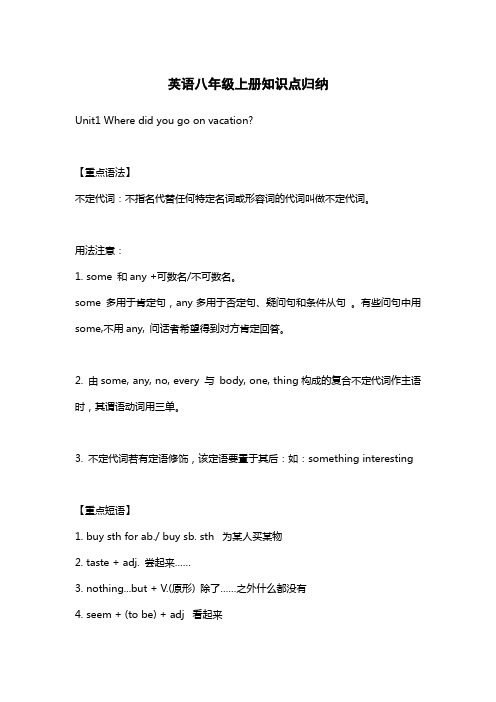
英语八年级上册知识点归纳Unit1 Where did you go on vacation?【重点语法】不定代词:不指名代替任何特定名词或形容词的代词叫做不定代词。
用法注意:1. some 和any +可数名/不可数名。
some 多用于肯定句,any多用于否定句、疑问句和条件从句。
有些问句中用some,不用any, 问话者希望得到对方肯定回答。
2. 由some, any, no, every 与body, one, thing构成的复合不定代词作主语时,其谓语动词用三单。
3. 不定代词若有定语修饰,该定语要置于其后:如:something interesting【重点短语】1. buy sth for ab./ buy sb. sth 为某人买某物2. taste + adj. 尝起来……3. nothing...but + V.(原形) 除了……之外什么都没有4. seem + (to be) + adj 看起来5. arrive in + 大地方/ arrive at + 小地方到达某地6. decide to do sth. 决定做某事7. try doing sth. 尝试做某事/ try to do sth. 尽力做某事8. enjoy doing sth. 喜欢做某事9. want to do sth. 想去做某事10. start doing sth. 开始做某事=begin doing sth.11. stop doing sth. 停止做某事区分:stop to do sth. 停下来去做某事12. dislike doing sth. 不喜欢做某事14. so + adj + that + 从句如此……以至于……16. tell sb. (not) to do sth. 告诉某人(不要)做某事17. keep doing sth. 继续做某事18. forget to do sth. 忘记去做某事/ forget doing sth 忘记做过某事【词语辨析】1. take a photo/ take photos 拍照quite a few+名词复数“许多…”2. seem + 形容词看起来…... You seem happy today.seem + to do sth. 似乎/好像做某事 I seem to have a coldIt seems + 从句似乎..…. It seems that no one believe you. seem like ... 好像,似乎….. It seems like a good idea.3. arrive in +大地点= get to= reach+地点名“到达......”arrive at +小地点(注:若后跟地点副词here/there/home, 介词需省略,如:arrive here; get home)4. feel like sth 感觉像…feel doing sth. 想要做某事5. wonder(想知道)+疑问词(who, what, why)引导的从句。
八年级英语7单元知识点

八年级英语7单元知识点八年级英语第七单元主要包含家庭、亲友关系、家务、购物等方面的词汇和语法知识。
以下将分别介绍各个方面的重要知识点。
家庭和亲友关系:1. 家庭成员的称呼:father(父亲)、mother(母亲)、parents (父母)、grandfather(爷爷)、grandmother(奶奶)、brother(兄弟)、sister(姐妹)、uncle(叔父)、aunt(姨母)、cousin (堂/表兄弟姐妹)、niece(侄女)、nephew(侄子)等。
2. 家庭成员的性格描述:例如 kind(友好的)、funny(有趣的)、clever(聪明的)、patient(耐心的)等。
3. 亲友关系:例如friend(朋友)、colleague(同事)、classmate(同学)、neighbor(邻居)、partner(伴侣)等。
家务:1. 家务动词:cook(烹饪)、clean(清洁)、wash(洗涤)、iron(熨烫)、sweep(扫地)、mop(拖地)、dust(擦拭)等。
2. 家务名词:dishes(餐具)、laundry(洗衣房)、garbage(垃圾)等。
3. 家务表达:例如,I need to do the dishes.(我需要洗餐具。
)购物:1. 商店和店员的称呼:supermarket(超市)、salesperson(售货员)、cashier(收银员)等。
2. 购物动词:buy(购买)、pay(支付)、save(省钱)、discount(折扣)等。
3. 购物表达:例如,Do you have this in a larger size?(你们有更大的尺码吗?)此外,本单元还包括介绍人物的基本信息、介绍家庭成员、表达喜恶等方面的语法知识,例如句型What does he/she look like?(他/她长什么样子?)、I'm good at cooking.(我擅长做饭。
八年级上册英语基础知识点

八年级上册英语基础知识点是学生在初中英语学习中必须掌握的基本知识点。
本文将从语法、词汇、听力、口语、阅读五个方面,为同学们提供详细的学习资料和方法。
语法在语法方面,我们需要了解的知识点主要包括动词时态、语态、情态动词和从句等。
在学习时态时,要注意动词的变化及其搭配。
在学习语态时,要理解被动语态和主动语态的区别,并能熟练运用。
情态动词可以帮助我们表达对某人或某事物的态度,因此需要掌握其用法。
对于从句的学习,需要注意其种类和连接词的使用,以及从句与主句的逻辑关系。
词汇词汇是英语学习的基础,而八年级要求同学掌握的词汇量也逐步增加。
通过背单词表、看英语电影或书籍等方式来扩充词汇量是比较有效的方法。
同时,我们还需要了解词汇的构词法和词性转换规则。
这些知识点帮助我们更好地理解单词及其在句子中的运用。
听力听力是英语学习中极为重要的一环。
同学们需要通过听录音、对话、报纸等方式来提高自己的听力水平。
在听力过程中,可以试着使用笔记方式来记录重点信息,或者反复听练来加深对语音语调的掌握。
口语英语口语能力不仅对英语学习有帮助,还会为将来的工作和出国留学提供很大的优势。
同学们可以通过口语训练班、与外教交流、模仿电视剧等方式来提高口语水平。
此外,了解英语国家的文化和习惯也是提高口语的重要因素。
阅读阅读是英语学习中的重要环节。
同学们需要逐步提高自己的阅读速度和阅读理解能力。
在阅读时,可以先了解文章的大意,再逐句理解和记忆。
同时,学习阅读技巧也是很重要的,比如寻找主题句、关键词及上下文提示等。
总结主要包括语法、词汇、听力、口语和阅读等方面。
在学习过程中,我们需要尽可能地多听多说、多读多写,加强语言输入和互动式的学习方式,及时解决困难和问题。
只有充分掌握基础知识,才能在英语学习的路上走得更远。
八年级上册英语期中复习资料
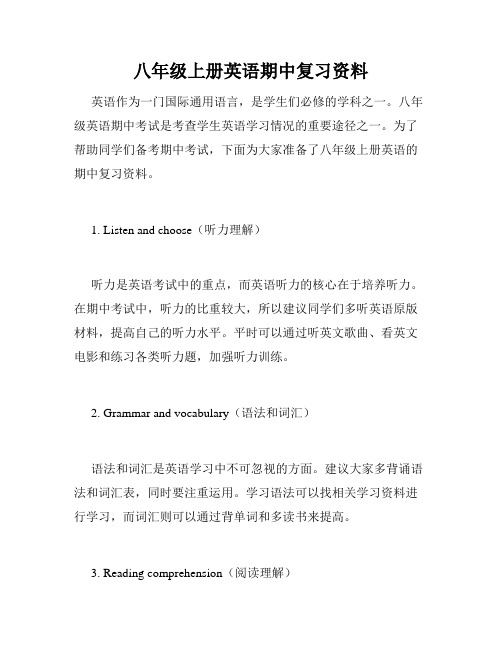
八年级上册英语期中复习资料英语作为一门国际通用语言,是学生们必修的学科之一。
八年级英语期中考试是考查学生英语学习情况的重要途径之一。
为了帮助同学们备考期中考试,下面为大家准备了八年级上册英语的期中复习资料。
1. Listen and choose(听力理解)听力是英语考试中的重点,而英语听力的核心在于培养听力。
在期中考试中,听力的比重较大,所以建议同学们多听英语原版材料,提高自己的听力水平。
平时可以通过听英文歌曲、看英文电影和练习各类听力题,加强听力训练。
2. Grammar and vocabulary(语法和词汇)语法和词汇是英语学习中不可忽视的方面。
建议大家多背诵语法和词汇表,同时要注重运用。
学习语法可以找相关学习资料进行学习,而词汇则可以通过背单词和多读书来提高。
3. Reading comprehension(阅读理解)阅读理解是英语考试中的难点,需要同学们用心去读,并提高阅读速度,积累阅读经验。
在考试前,可以多读英文短文和文章,同时注意紧扣文章主题,理解文章内容,掌握文章中的词汇和结构。
4. Writing(写作)英语写作并不是难事,只要养成好的习惯,多写多练,就可以熟练掌握写作技能。
在日常学习中,可以模仿范文进行写作,运用所学的语法和词汇,同时提高阅读和写作速度。
5. Speaking and pronunciation(口语和发音)英语口语是实践英语的重要环节之一,需要同学们多口语练习和模仿正常发音。
平时可以多与英语母语者交流,尽可能多地复述英文短语,同时可以多听标准的英语音频,提高自己的发音水平。
总之,八年级英语期中考试需要同学们综合运用所学知识,需要平常多练习、多积累。
只有通过适当的方法和正确的步骤,才能更好地迎接考试挑战。
最后,祝同学们期中考试取得好成绩!。
- 1、下载文档前请自行甄别文档内容的完整性,平台不提供额外的编辑、内容补充、找答案等附加服务。
- 2、"仅部分预览"的文档,不可在线预览部分如存在完整性等问题,可反馈申请退款(可完整预览的文档不适用该条件!)。
- 3、如文档侵犯您的权益,请联系客服反馈,我们会尽快为您处理(人工客服工作时间:9:00-18:30)。
一般将来时专项练习一、单项选择。
( ) 1. There __________ a meeting tomorrow afternoon.A. will be going toB. will going to beC. is going to beD. will go to be ( ) 2. Charlie ________ here next month.A. isn’t workingB. doesn’t workingC. isn’t going to workingD. won’t work ( ) 3. He ________ very busy this week, he ________ free next week.A. will be; isB. is; isC. will be; will beD. is; will be ( ) 4. There ________ a dolphin show in the zoo tomorrow evening.A. wasB. is going to haveC. will haveD. is going to be ( ) 5. –_____you ___free tomorrow?–No. I __ free the day after tomorrow.A. Are; going to; willB.Are; going to be; willC.Are; going to; will beD. Are; going to be; will be ( ) 6. Mother ________ me a nice present on my next birthday.A. will givesB. will giveC. givesD. give( ) 7. ________ a concert next Saturday?A. There will beB. Will there beC. There can beD. There are ( ) 9. If they come, we ________ a meeting.A. haveB. will haveC. hadD. would have ( ) 10. He ________ her a beautiful hat on her next birthday.A. givesB. gaveC. will givingD. is going to giving ( ) 11. He ________ to us as soon as he gets there.A. writesB. has writtenC. will writeD. wrote( ) 12. He ________ in three days.A. coming backB. came backC. will come backD. is going to coming back ( ) 13. If it ________ tomorrow, we’ll go roller-skating.A. isn’t rainB. won’t rainC. doesn’t rainD. does n’t fine ( ) 14.–Will his parents go to see the Terra Cotta Warriors tomorrow?–No, ____(不去).A. they willn’t.B. they won’t.C. they aren’t.D. they don’t. ( ) 15. They ________ an English evening next Sunday.A. are havingB. are going to haveC. will havingD. is going to have ( ) 16. ________ you ________ free next Sunday?A. Will; areB. Will; beC. Do; beD. Are; be ( ) 17. He ________ there at ten tomorrow morning.A. willB. isC. will beD. be( ) 18. ________ your brother ________ a magazine from the library?A. Are; going to borrowB. Is; going to borrowC. Will; borrowsD. Are; going to borrows ( ) 19. It ________ us a long time to learn English well.A. takesB. will takeC. spendsD. will spend ( ) 20. The train ________ at 11.A. going to arriveB. will be arriveC. is going toD. is arriving二、动词填空。
1. I ______(leave)in a minute. I ______(finish)all my work before I ______ (leave).2. —How long _____ you _____(study)in our country?—I _____(plan)to be here for about one more year.—I _____(hope)to visit the other parts of your country.—What ______ you ______(do)after you ______(leave)here?—I ______(return)home and ______(get)a job.3. I ______(be)tired. I ______(go)to bed early tonight.4. Mary’s birthday is next Monday, her mother _____(give)her a present.5. It is very cold these days. It ______(snow)soon.6. —_____ you _____(be)here this Saturday?—No. I ______(visit)my teacher.7. —______ I ______(get)you a copy of today’s newspaper?—Thank you.8. I am afraid there ______(be)a meeting thi s afternoon. I can’t join you.9. Mike ______(believe, not)this until he ______(see)it with his own eyes.10. Most of us don’t think their team ______(win).三、句型转换。
1. People in the north often go skating in winter. (next winter)2. There are two cinemas in that town. (next year)3. He comes back late.(in two days)4. She is a conductor of a train.(soon)5. Li Ming is ten years old.(next year)6. I sometimes write to my mother in the evening.(tonight)7. He went there by plane.(some day next year)8. China is a modern and strong country.(in twenty years)9. Do you study hard?(from now on)10. She didn’t speak English at the meeting.(before long)情态动词专项练习(1)1 John___ come to see us tonight, but he isn't very sure yet. A. may B. can C. has to D. must2 They ___ do well in the exam. A. can be able to B. be able to C. can able to D. are able to3 -May I take this book out? -No, you___. A. can't B. may not C. needn't D. aren't4 You___ go and see a doctor at once because you're got a fever. A. can B. must C. dare D. would5 -Can you speak Japanese? -No, I____. A. mustn't B. can't C. needn't D. may not(2) 1 -He___ be in the classroom, I think. -No, he ___ be in the classroom. I saw him go home a minute ago. A. can; may not B. must; may not C. may; can't D. may; mustn't2 -Shall I get one more cake for you, Dad? -Thanks, but you___, I've had enough.A. may noB. must notC. can'tD. needn't3 Even the top students in our class can't work out this problem, so it be very difficult.A. mayB. mustC. canD. need4 He isn't at school. I think he ___ be ill. A. can B. shall C. must D. has to5 ___ I take this one? A. May B. Will C. Are D. Do(3) 1 The children___ play football on the road. A. can't B. can C. mustn't D. must2 You _ be late for school again next time. A. mustn't B. needn't C. don't have to D. don't need to3 -Must I do my homework at once? -No, you___. A. needn't B. mustn't C. can't D. may not( 4) 1 His arm is all right. He___ go and see the doctor.A. has not toB. don't have toC. haven't toD. doesn't have to2 He had to give up the plan, ___ he? A. did B. didn't C. does D. doesn't3 They had to walk here, ___ they? A. mustn't B. did C. didn't D. hadn't( 5) 1 He had better stay here, ___ he? A. didn't B. don't C. hadn't D. isn't2 You'd better___late next time. A. not to be B. not be C. won't be D. don't be3 You'd better __ your hair __once a month. A. had; cut B. had; cuttedC. have; cut D. have; cutted4 You___ ask that man over there. Maybe he knows the way.A. had better not toB. had not betterC. had betterD. had better not( 6) 1 -Shall we go and visit the History Museum next Sunday?A. Here you areB. Sorry, I can'tC. Yes, pleaseD. Let me try2 -Why don't you ask Mike to go with us? -Thanks, ___.A. I will B. I won't C. lean D. I may3 -___ I take the newspaper away? -No, you mustn't. You____read it only here.A. Must; canB. May; canC. Need; mustD. Must; must(7) 1 Excuse me. ___ you please pass me that cup? A. Do B. Should C. Would D. Must2 ___ you like to have another try? A. Could B. Will C. Would D. Do3 -Would you like to go boating with us? -Yes, ___. A. I'd like B. I want C. I'd like to D. I do ( 8) 1 You__worry about your son. He will get well soon. A. needn't B. can't C. mustn't D. have to2 The poor man needs our help, ___ he? A. need B. needn't C. does D. doesn't3 -Must we do our homework first?-No, you___. You may have a rest first.A. mustn'tB. needn'tC. may notD. can't感叹句专项练习1.____ a nice watch it is!(山东) A. How B. What C. What a D. How a2. ____ bright girls they are!(浙江) A. What B. What a C. How D. How a3. ____ interesting the film is!(湖北) A. What B. What an C. How4. ____ sunny day! Let’s go out for a walk.(江西) A. How a B. How C. What a D. What5. ____ hard work it is!(浙江) A. How B.What C. What a D. What an6. ____ day it is! It’s rainy again. (江西)/A. How bad B. What a bad C. How fine D. What a fine 二.将下列句子变成感叹句:1. It is quite a nice present.→_____ _____ nice present!2. We have fine weather today.→_____ _____ weather we have today!3. It’s sunny today.→_____ _____ sunny day it is today!4. The children are working hard.→_____ _____ the children are working!5. She played basketball wonderfully.→_____ _____ she played b asketball!6. He sings well.→_____ _____ he sings!7. The fish is very lovely.→_____ _____ the fish is!比较级与最高级专项练习(一) 写出下列形容词与副词的比较级与最高级形式:long_____ ______ fat ______ _______ big ____ _____ heavy____ ______fast ______ _______ tall ____ _____ many______ _____well _____ _______ far____ _____ quickly______ _____ happy_____ ______ little______ ______(二)用所给词的正确形式填空:1. Of the four girls, I find Lucy the _______ (clever).2. Iron(铁)is ______ (much) useful than gold(黄金).3. My sister is two years _______ (old ) than I.4. John’s parents have four daughters, and she is the _____ (young) child.5. The _____ (cheap) bags are the not usually the best ones.6. The one is much_______ expensive than that one.7. The boy is ______ (interesting) than his brother.8. Dick sings ___ (well), she sings ___ (well) than John, but Mary sings_____(well) in her class.9. She will be much ______ (happy) in her new house.10. This dress is ______ (cheap) than that one.(三)选择填空:1. He feels _____ today than yesterday. A. tired B. more tired C. more tireder D. much tired2. Which do you like _____,tea or milk? A. the best B. better C. the better D. good3. Of the three toys, the child bought _____ one.A. the expensiveB. one most expensiveC. a least expensiveD. the most expensive4. The line is __than that one.A. more longerB. not longerC. much more longerD. many more longer5. Today is much ______ than yesterday. A. wet B. weter C.wetter D. wettest6. The book is ____ than that one. A. cheap B. the cheap C. more cheaper D. cheaper7. She looks _____ than she does. A. the more older B. very older C. much older D. more older8. The garden is becoming ______. A. more beautiful and more B. more beautiful and beautifulC. more and more beautifulD. more beautiful and beautifuler9. They competed(比赛)to see who could work _____.A. the fastest and bestB. the faster and the betterC. fastest and betterD. faster and better10.Trains are ____ than planes. A. faster B. fast C. slower D. slow11.Tom runs ____ than Jim. A. quicklier B. more quickly C. quicker D. more quicker1.My mom bought me a medium coke,______?2.You went to your grandma's home,________?3.He will go home,________?4.She doesn't like to eat apples,_______?5.Your room looks so big,_______?6.You won't sleep early,_________?7.Your are never late for school,______? 8.You watched the football match last week,______?9.My mother is cooking,__________? 10.Your father plays the computer very well,__________?11.You were moved by your students,________? 12.Jogging makes us healthy,______________?13.The sewing machine can make the clothes, ? 14.My mother doesn't enjoy smoking,______?15.You don't want to be a teacher in the future,________? 16.You look so happy today,________?17.Few of them hurt themselves in the accident last night, ___________ ?18.John can hardly understand any Chinese, _____?19.Don’t smoke in the meeting-room, _____?20.Miss Cheng will never forget her first visit to Canada ,________?过去进行时专项练习1. While we __________ (wait) for the bus, a girl __________ (run) up to us.2. I __________ (telephone) a friend when Bob __________ (come) in.3. We __________ (test) the new machine when the electricity __________ (go) off.4. While mother ________ (put) Cathy to bed, the door bell ________ (ring)5. As I __________ (walk) in the park, it __________ (begin) to rain.6. It was quite late at night. George __________ (read) and Amy __________ (ply) her needle when they __________ (hear) a knock at the door.。
